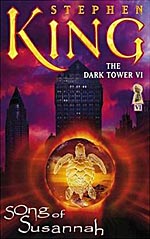
![]() Sable Aradia
Sable Aradia
1/6/2018
![]()
Read for the Second Best Reading Challenge, the Apocalypse Now! Reading Challenge, the High Fantasy Reading Challenge, and the Read the Sequel Reading Challenge.
This novel was nominated for the Locus Award.
I'd almost forgotten all of this one in my re-read. This is my least favourite of the Dark Tower novels. While it carries a lot of the weird mysticism introduced in the rest of the novels to their logical conclusion, and it's a necessary step in the plot, mostly it's kind of painful. Two major plot threads run through it.
The first details Roland and Eddie following up on the bookstore owner integral to maintaining an important site, the protection of which is necessary for the protection of the universe. But this involves meeting the writing Stephen King, which, as has been pointed out, is the ultimate writer's conceit.
Two things save it from being a total crash-and-burn. The first is that King portrays himself with as sharp a lens as he does all his other characters; they meet him as an arrogant young author who's had some early successes, when he was well on his way to being an active alcoholic if he wasn't already, and Roland at one point under hypnosis tells him to "stop his snivellment." He's clearly an ordinary guy, and not a Gunslinger, like his characters.
The other thing is that this scene is actually necessary in the internal logic of King's universe. If this Earth is the Keystone of all Earths in parallel dimensions, then it's very important that King finish the Dark Tower stories. And he doesn't want to. And naturally, the bad guys wouldn't want him too either, and that would have to become part of the narrative. I think he knew it was odd, too, and he tried to handle it as carefully as he could. But it is still the ultimate writer's conceit.
However, this scene was the thing I remembered most clearly in this particular novel, so something about it stuck with me. I guess it's good despite itself, if that's something that makes sense. He speaks of the feeling some writers have, especially when it's good, that we're just channeling something from somewhere else; that we're not actually "writing" the story at all. I can identify with that.
The other storyline follows Suzannah, who is possessed by Mia, a demon who wants her to bear an Antichrist sort of baby. She fights the demon for control of her body for most of the time, and mostly fails. This, from a Gunslinger, whose strength of will is powerful enough to stop her body from going into labour. This, from maybe the strongest female character King has ever created. Not to mention that most of that plot is an infodump, and it feels like repetition, after the business with Detta/Odetta that we thought we were done with after book 2. It's irritating and mostly frustrating. I suppose he was going with the philosophy that plot is moved by having the worst thing that could possibly happen to that particular character happening to her, but damn, the whole thing requires a firmly held nose to make it through.
It carries on from the cliffhanger of book 5 and ends on a cliffhanger too. So books 5 through 7 should be viewed as one long story, split at convenient points like Lord of the Rings. Just bear this in mind if you're going to read it.
On the other hand, you keep reading, because you just haveto know how it ends.
Not my favourite, but it's necessary. Moving on to the final book now in my re-read. And I just became aware there's at least one Dark Tower novella out there I haven't read. Have to track it down now.
http://dianemorrison.wordpress.com